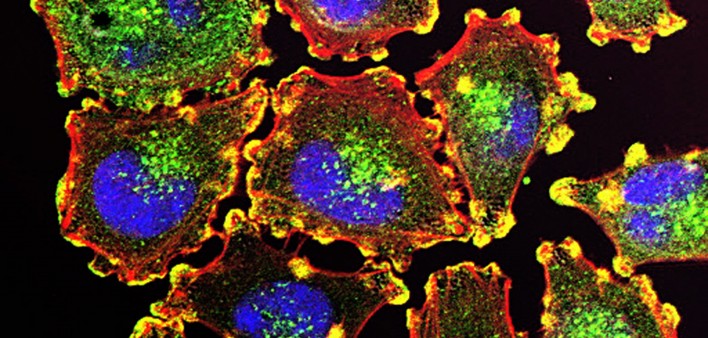 Many cancer immunotherapies, drugs that activate a patient’s immune system, have emerged in recent years, but none are universally effective. To address this shortcoming, Clinical Investigator Anusha Kalbasi, MD, and colleagues at the University of California Los Angeles found a drug that activates the body's natural defenses by behaving like a virus and may uncloak certain stealthy melanoma tumors, so they can be better targeted by immunotherapy.
Many cancer immunotherapies, drugs that activate a patient’s immune system, have emerged in recent years, but none are universally effective. To address this shortcoming, Clinical Investigator Anusha Kalbasi, MD, and colleagues at the University of California Los Angeles found a drug that activates the body's natural defenses by behaving like a virus and may uncloak certain stealthy melanoma tumors, so they can be better targeted by immunotherapy.
How tumors escape the immune system
Most immunotherapy approaches rely on the ability of T cells to recognize and kill tumor cells. But in some patients, tumors escape the immune system through mutations in genes involved in the interferon signaling pathway. Interferons are proteins in cells that respond to viral infection by impeding the virus's ability to replicate and alerting the immune system to marshal its forces. Activating interferon signaling in tumors helps slow down tumor division and can lead to the release of molecules that recruit more immune cells to the tumor.
Dr. Kalbasi and his colleagues turned to a virus-mimicking drug called BO-112 that activates virus-sensing pathways in tumors. They tested BO-112 in lab dish experiments and a mouse model of melanoma, a common skin cancer. When the drug was injected directly into the tumor in the laboratory, they discovered that the activation of virus-sensing pathways increased antigen presentation even when interferon signaling was defective. Antigen presentation makes tumors visible to T cells. As a result, these tumors could be recognized and killed by T cells.
Combination treatments to bolster immunotherapy

New strategies to promote antigen presentation to make tumors more visible to the immune system may help immunotherapy drugs to be effective for more tumor types and prevent drug resistance. In a separate clinical trial, published the same day, 44 human patients took BO-112 with and without additional cancer treatments, so researchers could begin to analyze how safe and effective the drug is in people. The early results hint that BO-112 can make tough-to-treat tumors vulnerable to immunotherapy.
Dr. Kalbasi is now leading a larger human clinical trial that combines BO-112 with nivolumab, an immune checkpoint blockade drug, to treat people with certain types of sarcoma. The goal is to activate the immune system against the patient's tumor while the tumor is still in the body.
This research was published in Science Translational Medicine.
Read more: Drug tricks cancer cells by impersonating a virus







